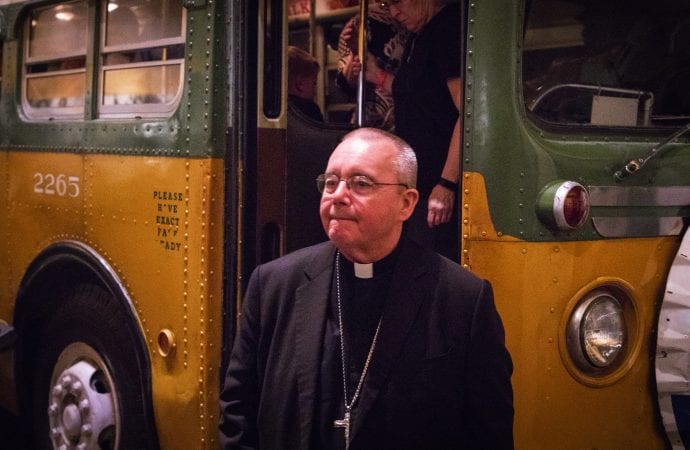Bishop David Talley has one word to describe his initial two weeks and three days on the job in Memphis: “joy.”
Talley, who was installed as the new head of the diocese earlier this month, says that he’s been welcomed “with open arms” by the clergy, religious, and laity alike.
Although he didn’t arrive on the scene under the most joyful of circumstances - his predecessor resigned his post in October of last year after a Vatican-backed investigation into his management style - the Georgia native says that hasn’t prevented him from experiencing happiness in his new home of West Tennessee.
In an interview with Crux, Talley said he recognizes the “overarching challenge of leadership” facing the diocese.
“The people are looking to be secure,” he said. “We had a wonderful administrator [Archbishop Joseph Kurtz of Louisville], but I feel viscerally the need for leadership.”
He said that his predecessor, Bishop Martin Holley, has been “very generous to me,” noting that he’s been in contact not to discuss diocesan policy or personnel matters but has texted with him to let him know he’s praying for him and the diocese.
Meanwhile, Talley has reengaged emeritus Bishop Terry Steib - who served the diocese for nearly a quarter century before his retirement in 2016 - and moved him back into an office in the diocesan chancery to provide support and counsel at Talley’s request.
During his installation homily, he called for a “new heart” for the diocese, seeking unity for a diocese that has been roiled by division. While much of Talley’s attention, at least in his early months, will have to have an inward focus in terms of helping the diocese rebuild, that hasn’t prevented him from having an outward focus on the world around him.
The morning after his installation, he joined friends and family members for a tour of Memphis’s National Civil Rights Museum, which is on the site of the Lorraine Motel, where Dr. Martin Luther King, Jr. was assassinated.
For a man who was raised as a Southern Baptist and then left the denomination over the issue of segregation and later converted to Catholicism, he’s become a prominent voice among U.S. bishops on the issue of race relations.
Talley serves as a member of the United States Conference of Catholic Bishops’ (USCCB) ad hoc committee against racism and was involved in the release of the pastoral letter on racism by the USCCB last fall - the first time the U.S. bishops spoke collectively on the issue of race in nearly 40 years.
He laments the fact that the letter’s release was overshadowed by the focus on responding to the latest wave of the clerical sex abuse crisis at the USCCB general assembly in November, although he said it was understandable as there was “so much tumult in the air.”
Even so, he said he’s “very proud” of the women and men who worked on the letter and that it’s a “document not limited to just 2018 or 2019” but one meant to state “with vigor the tragedy of racism and the tragedy of prejudices.”
The letter, he says, will be useful in guiding the Church to “seek justice according to God’s plan,” and he told Crux that once he is better settled into his new role, he looks forward to determining specific means of implementation for it on a local level in Memphis.
While the issue of sex abuse has plagued the broader U.S. Church, Talley says that in the nearly ten parishes he’s visited since he’s been on the job, no one has raised the issue with him.
This week he will hold his first meeting with the diocesan review board who will bring him up to speed on the local policies and issues, but for him the matter is straightforward: “The sexual abuse of minors is a crime.” He says the Church has to do its job to make sure these cases are reported first to the police so that they can carry out their own investigation, but that the Church must work to have its own policies and procedures in order.
When it comes to the issue of holding bishops accountable, he says that “first and foremost, I have to hold myself accountable before the Lord, but I recognize that we [the U.S. bishops] also have to have a mechanism for holding each other accountable.”
As of now, he doesn’t have his mind made up on what exact model he believes should be enacted, but says he will discern the matter with openness and prayer as the bishops head into their meeting in June to vote on new proposals.
At age 68, Talley has said that his move to Memphis marks the last stage in his career. In many respects, the task ahead of him, be it in his diocese or on the national scene, will be that of bridge building in an increasingly fractured Church.
“We, as Catholics, are meant to be engaged in the world,” he told Crux. “But our engagement is in the Lord.”
“I don’t talk about politics or political parties,” he continued. “I talk about Christ-centered principles.”
To engage in this task of building unity, he believes the Church must emphasize “the value of all who are broken and those on the margins and to lift them up.”
“All three of the last popes - John Paul II, Benedict, and Francis - have been great examples on this,” he said. “Lifting up and confronting the brokenness of everyone unites the Church and is who we are to be.”

